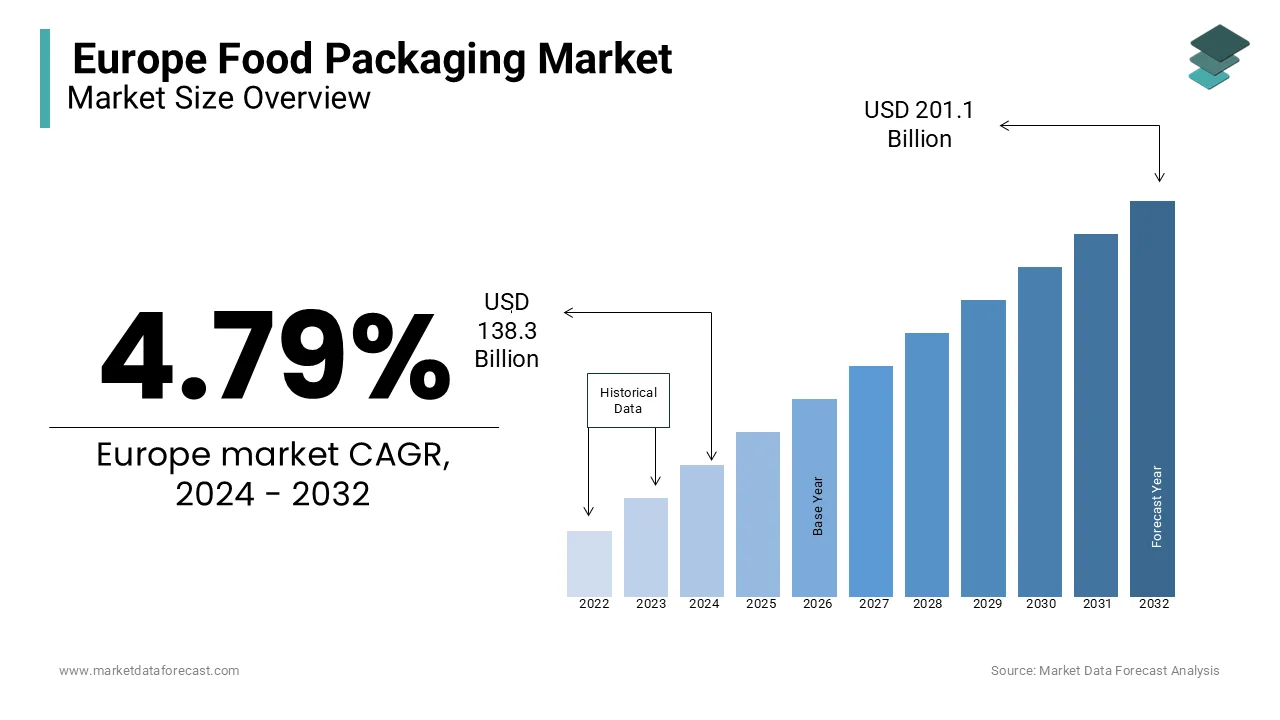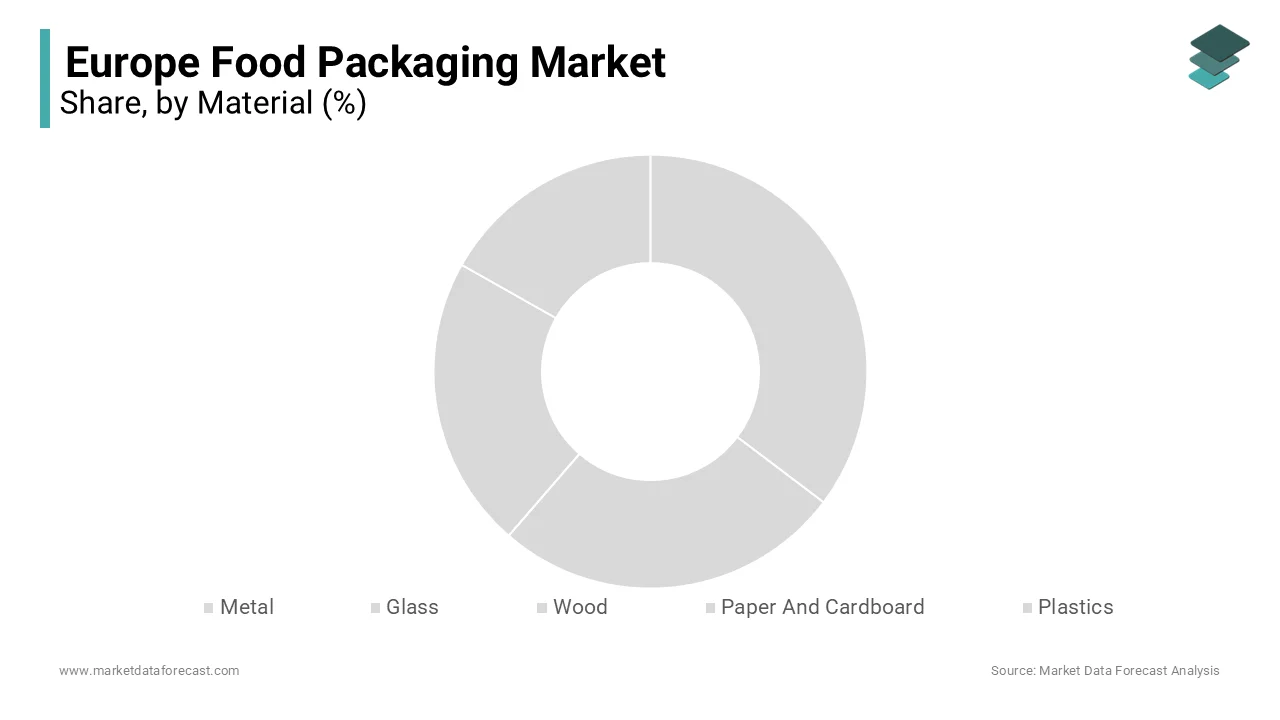Europe Food Packaging Market Size, Share, Trends & Growth Forecast Report By Materials, Product, Application, And Country (UK, France, Spain, Germany, Italy, Russia, Sweden, Denmark, Switzerland, Netherlands, Turkey, Czech Republic and Rest of Europe), Industry Analysis From 2025 to 2033
Europe Food Packaging Market Size
The food packaging market size in Europe was valued at USD 138.3 billion in 2024. The European market size is further expected to be valued at USD 210.71 billion by 2033 from USD 144.92 billion in 2025, growing at a CAGR of 4.79% from 2025 to 2033.

Food packaging is the process of packaging food to protect it from contamination, damage, pest attack, spoilage, and damage during transportation, storage, and retail. Food packaging includes products such as bottles, cans, ampoules, bottles, aerosol containers, plastic cans, and wrappers to protect food from long-term contamination. Food packaging serves a variety of purposes, from protecting food to creating portion sizes to providing information about a product. It plays an essential role in maintaining the quality and safety of food during handling and transportation. Food packaging provides a means of marketing for food service providers, helps communicate information, and improves customer satisfaction.
MARKET DRIVERS
As population dynamics shift from rural to urban areas, the European Food Packaging market grows as people's preference for processed foods increases. The European food packaging market is largely driven by a number of factors, including increasing urban populations and changes in consumer spending patterns, especially in developing countries due to rapid changes in the economy. Furthermore, the demand for ready-to-eat and frozen foods is strong due to the growing workforce and the expansion of the retail sector, which leads to the Europe food packaging market during the forecast period.
Furthermore, factors such as population growth, increased disposable income, and declining households have a positive impact on the European food Packaging market. The improved shelf life is expected to spur European food packaging market growth. The European Food Packaging market is expected to increase the consumption of packaged foods and the popularity of single-serving packages due to the growing urban population. The Europe food packaging market is also favored by factors such as increasing demand from RTC and RTE food end users, automation, and modification of food safety regulations from various government agencies such as FDI. With an increasing awareness of environmental pollution and global warming, more and more people do not prefer green food packaging technology, and this has had a significant impact on the growth of the Europe food packaging market.
In addition, the increasing disposable income of people around the world, increasing demand for ready-to-eat foods, and increasing customer awareness of packaged foods complement the development of the European food Packaging market. The growing demand for recyclable, reusable, and environmentally friendly packaging solutions has been driven by growing environmental and human health concerns, which are expected to provide profitable opportunities for players in the food service packaging industry.
Food packaging solutions offer amazing benefits, such as increased food safety, longer shelf life, and greater convenience. At the same time, a number of growth opportunities are flourishing in the European food packaging market as consumers' propensity to use sustainable and environmentally friendly packaging increases and concerns about food safety and contamination increase. Increasing consumption of convenient foods in line with rapidly changing consumer lifestyles is driving the growth of the European food packaging market. Food packaging ensures food protection and improves product shelf life to attract more customers. The Europe Food Packaging market is expected to grow significantly over the forecast period with the emergence of numerous production facilities aimed at keeping up with the latest market trends.
Furthermore, rapid changes in people's lifestyles and changes in consumer food preferences, along with population growth in the countries, are expected to drive market growth during the forecast period. An increase in the workforce, rising disposable income, and a busy lifestyle are driving the European Food Packaging market as people's preference for processed foods increases, and the demographic dynamics of Rural to urban areas are also driving the European Food Packaging market. Changes in people's lifestyles and consumer food preferences, along with population growth in developing countries, will drive the growth of the European food packaging market during the forecast period.
MARKET RESTRAINTS
Factors impeding the growth of the European Food Packaging market are concerns about side effects and the generation of packaging material waste. The European Food Packaging market is expected to remain highly regulated as institutions such as the European Commission impose strict regulations on the types of food packaging and the use of food contact materials, and the slow growth of packaging. The complex nature of the food service packaging supply chain is expected to constrain the growth of the European Food Packaging market during the forecast period. Concerns about waste from improper packaging can stunt the growth of the European food packaging market.
SEGMENTAL ANALYSIS
By Material Insights

The growth of the paper and paper-based materials sector is driven by the high adoption of products to replace non-biodegradable packaging solutions. Plastic food packaging is expected to show rapid growth due to end-user adoption at an affordable price. Metal containers are commonly used in applications such as canned fish, food, meat, and fruit. The glassware segment is expected to reach $ 43.5 billion by 2026 as demand for food-grade glass containers increases due to its non-corrosive nature.
By Product Insights
The rigid packaging segment held the major share of the European food packaging market in 2023. Rigid packaging is widely used because it prevents contamination of food due to properties such as a high barrier to moisture, light, and oxygen. Semi-rigid packaging applications include the packaging of fresh sandwiches, dairy products, bakery products, and confectionery. Flexible packaging is the fastest-growing segment between 2021 and 2026, with a CAGR of around 6.0% due to its ability to form thinner, lighter, and more compact packaging. The shift in demand from rigid packaging solutions to flexible packaging solutions is expected to drive growth in the sector.
By Application Insights
The meat segment accounted for the largest share of the European food packaging market in 2023. The meat industry is the most attractive application in the food packaging market. Consumption of meat and seafood increases as consumers increase their preference for high-protein foods.
REGIONAL ANALYSIS

Europe represents the second-largest food packaging market in the world due to the region's well-established food processing industry. Europe's single market policy allows free trade within the region, which is expected to stimulate exports and consequently promote the growth of the European Food Packaging market. The growing consumer preference for packaged food is a factor that the UK food packaging market is expected to increase over the forecast period. The growth of food packaging in Germany will be driven by new technologies and innovations in food packaging. This has impacted the German food packaging market to an extent. Increased foreign direct investment (FDI) in the food industry and excessive consumption by consumers are driving the growth of the France food packaging market. Spain's food packaging market growth is accelerating further due to strict government regulations that focus on health, safety, and food quality.
KEY MARKET PLAYERS
Companies that play a significant role in the Europe food packaging market include Amcor plc, Ball Corporation, Crown, EasyPak, WestRock Company, Silgan Holdings, Inc., Sealed Air, Owens-Illinois Inc., Tetra Pak International S.A. And Toyo Seikan Group Holdings Ltd.
MARKET SEGMENTATION
This research report on the European food packaging market has been segmented and sub-segmented based on the following categories.
By Material
- Metal
- Glass
- Wood
- Paper And Cardboard
- Plastics
By Product
- Semi-Rigid
- Rigid
- Flexible
By Application
- Bakery & Confectionery
- Fruits & Vegetables
- Meat
- Dairy Products
- Sauces
- Dressings and Condiments
- Poultry & Seafood
- Others
By Country
- UK
- France
- Spain
- Germany
- Italy
- Russia
- Sweden
- Denmark
- Switzerland
- Netherlands
- Turkey
- Czech Republic
- Rest of Europe
Related Reports
Access the study in MULTIPLE FORMATS
Purchase options starting from $ 2000
Didn’t find what you’re looking for?
TALK TO OUR ANALYST TEAM
Need something within your budget?
NO WORRIES! WE GOT YOU COVERED!
Call us on: +1 888 702 9696 (U.S Toll Free)
Write to us: [email protected]